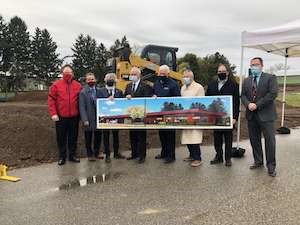Construction underway at UGuelph field crop building
A new field crop services building, which is currently under construction at the University of Guelph’s Ridgetown Campus, has been designed to attract the best and brightest students and researchers.
 Perth-Wellington MPP Randy Pettapiece, parliamentary assistant to the Minister of Agriculture, Food and Rural Affairs, announced on October 19 that the province will invest $6.5 million toward construction of the facility.
Perth-Wellington MPP Randy Pettapiece, parliamentary assistant to the Minister of Agriculture, Food and Rural Affairs, announced on October 19 that the province will invest $6.5 million toward construction of the facility.
He joked that the previous facility, which was built in the 1940s, looked like a bunker.
“It’s not the most friendly place to work in, and that’s what researchers are looking for. They’re looking for first-class,” he said. “Once you get those people here, and their names get out there, that will attract their students.”
Provincial funding is being provided through the Agricultural Research Institute of Ontario. The money will support construction of a 12,000-square-foot facility intended to modernize crop research on campus and provide students with a cutting-edge space to conduct research and learn from industry experts.
Construction is underway, and completion is targeted for spring 2022.
“As Canada’s food university, the University of Guelph is committed to providing Ontario’s farmers with world-class research and on-farm solutions that promote crop health and productivity,” said Malcolm Campbell, vice-president (research). “Investments in infrastructure ensure researchers have the tools they need to make profoundly important discoveries that fuel innovation and that ensure crop production remains economically competitive and a mainstay of safe, dependable, sustainable and nutritious food.”
The new building will bring existing crop sample receiving, processing and storage facilities under one roof.
“Building a new home for agronomy at the Ridgetown Campus of the University of Guelph is part of our strategy to modernize our current research network,” said Ernie Hardeman, minister of agriculture, food and rural affairs. “Investments in agri-food research infrastructure contribute greatly to the sustainability, protection and viability of the Ontario food supply.”








